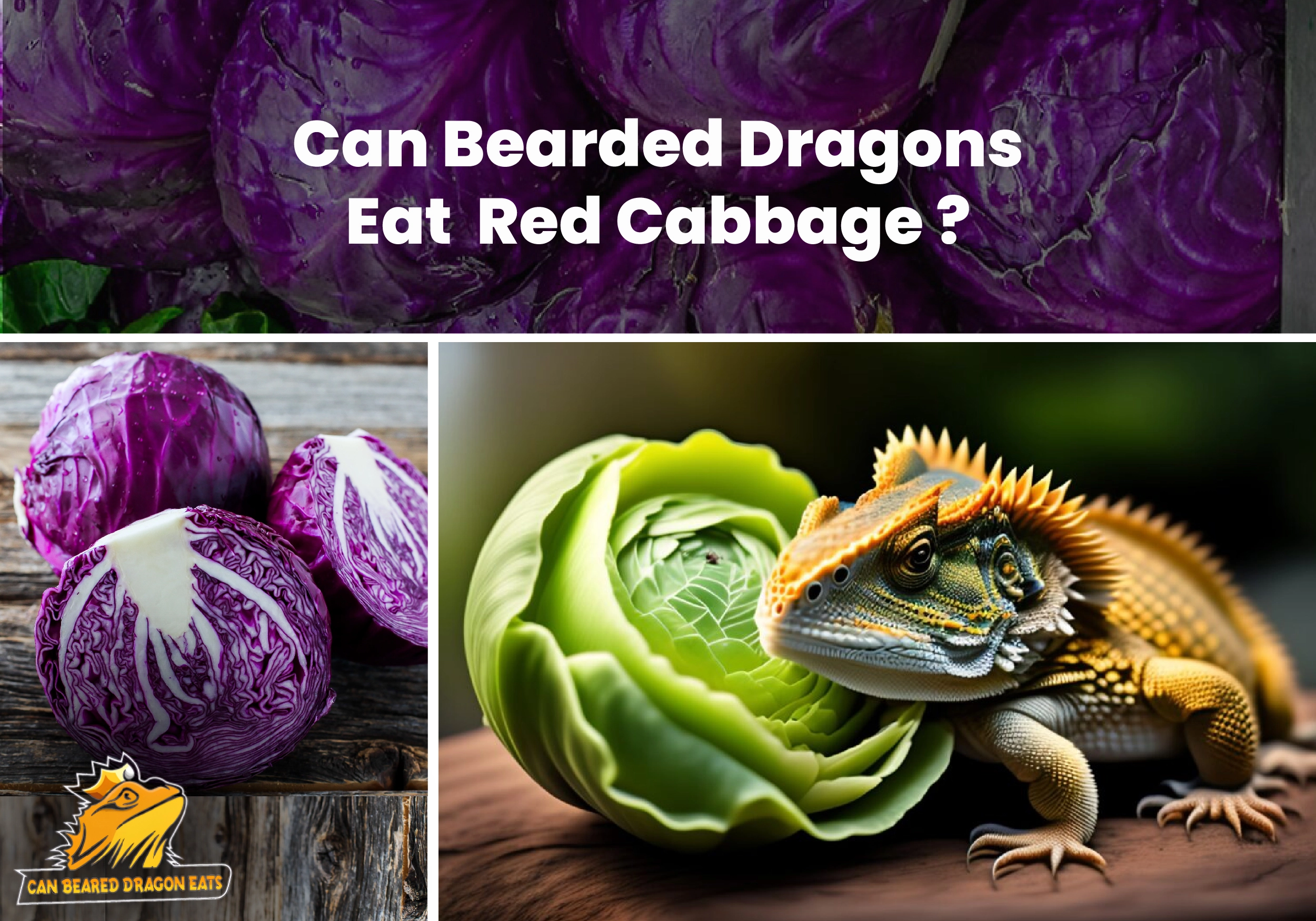Have you ever wondered if our scaly companions can bearded dragons eat red cabbage? As a passionate reptile enthusiast myself, I understand the importance of providing our bearded dragons with a balanced and wholesome diet. These captivating creatures deserve the very best care, including a varied selection of greens and vegetables. However, when it comes to introducing new foods, caution is always warranted.
Red cabbage’s vibrant purple hue and impressive nutrient profile may seem like a promising addition to a bearded dragon’s menu. Rich in essential vitamins and minerals, it is undoubtedly a tempting choice. However, we must explore the potential benefits and risks before serving it up on a platter.
In this blog post, I will delve into the world of bearded dragon nutrition to determine whether red cabbage can be a safe and nutritious addition to their diet. I will present you with scientific facts, expert opinions, and practical considerations, allowing you to decide on your scaly friend’s health and happiness.
Read more : Can bearded dragons eat corn?
Nutritional Benefits of Red Cabbage for Bearded Dragons
When it comes to providing a wholesome and balanced diet for our bearded dragons, incorporating a variety of nutrient-rich vegetables is crucial. Red cabbage, with its vibrant color and distinctive flavor, offers several nutritional benefits that can contribute to the overall well-being of our scaly companions.
Let’s explore the key nutrients found in red cabbage that make it a potentially valuable addition to their diet.
Vitamins and Minerals
Red cabbage is packed with essential vitamins and minerals that are beneficial for bearded dragons. It is an excellent source of vitamin C, which aids in boosting their immune system and promoting overall health. Additionally, red cabbage contains vitamin K, which plays a crucial role in blood clotting and bone health. The presence of minerals such as calcium, potassium, and manganese further contributes to maintaining strong bones and supporting various physiological functions.
Fiber Content
Fiber is an essential component of a bearded dragon’s diet, promoting healthy digestion and preventing constipation. Red cabbage is relatively high in fiber, which can help regulate the digestive system and maintain optimal gut health. Including red cabbage in their meals can be a great way to introduce a source of dietary fiber.
Antioxidant Properties
Red cabbage is rich in antioxidants, such as anthocyanins, which give it its vibrant purple color. These antioxidants help combat harmful free radicals and reduce oxidative stress in the body. By including red cabbage in their diet, bearded dragons can benefit from the potential protective effects against cellular damage and certain diseases.
While red cabbage offers these nutritional benefits, it is important to remember that moderation is key. Bearded dragons should consume a varied diet that includes a mix of vegetables, greens, and protein sources to meet their specific nutritional requirements. Always introduce new foods gradually and observe how your dragon responds to ensure their health and well-being.
EXPERT TIP (WebMD): Be aware of any pre-existing health conditions your bearded dragon may have, such as kidney issues or thyroid-related problems. In such cases, it is advisable to consult with a reptile veterinarian before including red cabbage in their diet.
Nutritional values of Red Cabbage for Bearded Dragons
According to Healthline, Here’s a table showcasing the approximate nutritional values of red cabbage for bearded dragons:
| Nutrient | Amount per 100g |
| Carbohydrates | 7g |
| Manganese | 0.2mg |
| Potassium | 243mg |
| Vitamin C | 36.6mg |
| Calcium | 40mg |
| Protein | 1.4g |
| Fat | 0.2g |
EXPERT TIP: Before offering red cabbage to your dragon, remove the tougher outer leaves and focus on the tender inner leaves, which are easier for them to chew and digest. When introducing red cabbage to your bearded dragon’s diet, do so gradually. Start with small amounts and monitor their response for any signs of digestive upset or adverse reactions.
How to Prepare The Red Cabbage For Bearded Dragons?
When it comes to preparing red cabbage for your bearded dragon, it is essential to follow a few guidelines to ensure their safety and maximize nutritional benefits. Here are some steps to consider:
Selection and Washing
Choose fresh, organic red cabbage free from any signs of decay or damage. Thoroughly wash the cabbage under running water to remove any dirt, pesticides, or contaminants that may be present on the surface.
Leaf Preparation
Carefully remove the outer leaves of the cabbage, as they tend to be tougher and harder to digest. Instead, focus on the inner leaves, which are more tender and suitable for your dragon’s consumption.
Chopping or Shredding
Cut the red cabbage into small, bite-sized pieces or shred it finely. This will make it easier for your bearded dragon to eat and reduce the risk of choking.
Steaming or Boiling
To enhance digestibility and reduce potential oxalates, it is recommended to steam or boil the red cabbage. Steam the chopped cabbage for a few minutes until it becomes slightly tender. Alternatively, you can boil it in water for a short period. Avoid overcooking, as excessive heat can deplete the nutritional content.
Cooling and Serving
After steaming or boiling, allow the red cabbage to cool down before serving it to your bearded dragon. Excessively hot or warm food can harm their sensitive digestive system. Serve the cooled red cabbage alongside other suitable vegetables and greens in their feeding dish.
Remember to introduce new foods gradually and monitor your bearded dragon’s response. If they show signs of digestive distress or discomfort, discontinue feeding red cabbage and consult a reptile veterinarian for further guidance.
By following these preparation steps, you can provide your bearded dragon with a safe and nutritious serving of red cabbage, promoting its overall health and well-being.
Read more : Can Bearded Dragons Eat Iceberg Lettuce?
How often can bearded dragons have red cabbage?
Bearded dragons can have red cabbage as an occasional treat, about once or twice a month. While red cabbage offers some nutritional benefits, it should not be a regular part of their diet. Bearded dragons require a varied and balanced diet that includes a mix of vegetables like onion, cucumbers, pumpkin, Celery greens, and protein sources.
Overfeeding red cabbage or offering it too frequently can increase the risk of health issues associated with goitrogens and oxalates. It’s important to provide a diverse range of foods to ensure they receive a wide array of nutrients.
EXPERT TIP: Lightly steam or boil red cabbage before feeding it to your bearded dragon. This helps improve its digestibility and reduces the risk of potential oxalate-related issues.
Potential Risks of Red Cabbage for Bearded Dragons
While red cabbage can provide valuable nutrients to your bearded dragon’s diet, it is essential to be aware of potential risks and take necessary precautions. Here are some important considerations:
Goitrogenic Properties
Red cabbage, like other cruciferous vegetables, contains goitrogens. Goitrogens can interfere with thyroid function and may inhibit the absorption of iodine, potentially leading to thyroid-related issues in bearded dragons.
Although small amounts of red cabbage are generally safe, excessive consumption could pose a risk. To minimize this risk, it is crucial to offer red cabbage in moderation and ensure a balanced diet that includes other safe greens and vegetables.
High Oxalate Content
Red cabbage is known to have a moderate to high oxalate content. Oxalates can bind with calcium, forming calcium oxalate crystals, which can hinder calcium absorption and may contribute to the development of kidney stones or other urinary tract issues in bearded dragons. To reduce the risk of oxalate-related complications, it is advisable to offer red cabbage sparingly and alongside calcium-rich foods.
Individual Sensitivities
Each bearded dragon is unique, and some individuals may be more sensitive to certain foods than others. While red cabbage may be well-tolerated by many bearded dragons, some individuals may experience digestive upset or other adverse reactions. It is important to observe your dragon closely after introducing red cabbage and discontinue its use if any negative symptoms occur.
Pesticide Residues
If not organically sourced, red cabbage may contain pesticide residues. Pesticides can be harmful to reptiles, so it is recommended to choose organic produce or thoroughly wash conventionally grown cabbage to minimize pesticide exposure.
As with any new food, it is crucial to introduce red cabbage gradually into your bearded dragon’s diet and monitor their response. If you have any concerns or your dragon shows any signs of illness or discomfort, consult a reptile veterinarian for professional advice.
EXPERT TIP: Red cabbage should be part of a varied and balanced diet that includes a mix of vegetables, greens, and protein sources. It should not replace other essential components of their diet.
Read more : Can bearded dragons eat basil leaves?
Can bearded dragons eat raw red cabbage?
While raw red cabbage is not toxic, it may be harder to digest for bearded dragons.
Can bearded dragons eat only the leaves of red cabbage?
Bearded dragons can eat the leaves of red cabbage, but it is important to remove the tougher outer leaves and offer the inner, tender leaves.
Can baby bearded dragons eat red cabbage?
It is recommended to introduce red cabbage to baby bearded dragons gradually and in smaller quantities.
Can bearded dragons eat red cabbage stems?
While the stems of red cabbage are not toxic, they are tougher and may be more challenging for bearded dragons to chew and digest.
Can bearded dragons eat red cabbage every day?
No, red cabbage should not be fed to bearded dragons daily due to its potential risks.
Can red cabbage improve the color of a bearded dragon’s scales?
No, red cabbage will not directly improve the color of a bearded dragon’s scales.
Can bearded dragons eat cooked red cabbage leftovers?
Bearded dragons can eat cooked red cabbage leftovers, but it’s important to exercise caution. Leftover cooked red cabbage should be stored properly and refrigerated promptly after cooking to prevent bacterial growth.
Can bearded dragons eat frozen red cabbage?
Bearded dragons can eat frozen red cabbage, but it’s generally recommended to offer fresh produce whenever possible. Freezing can affect vegetables’ texture and nutritional content, including red cabbage.
However, if you choose to feed frozen red cabbage, it’s important to thaw it thoroughly before offering it to your bearded dragon. This can be done by allowing it to defrost in the refrigerator or gently heating it until it reaches room temperature.
The Bottom Line
Red cabbage can be a nutritious addition to a bearded dragon’s diet when offered in moderation and alongside a balanced meal plan. While it provides essential vitamins, minerals, and fiber, it is crucial to be aware of the potential risks associated with goitrogens and oxalates. Red cabbage should not be a staple food but rather an occasional treat, introduced gradually and monitored for any adverse reactions.
When preparing red cabbage, remember to remove the tougher outer leaves, lightly steam or boil it, and offer it in small, bite-sized pieces. Bearded dragons have unique dietary needs, and it is essential to provide them with a varied selection of vegetables, greens, and protein sources to ensure their optimal health.
- Eastern Bearded Dragon - July 26, 2024
- Why Do Bearded Dragons Bob Their Heads? - July 25, 2024
- Everything You Need to Know About Paradox Bearded Dragons - July 10, 2024

